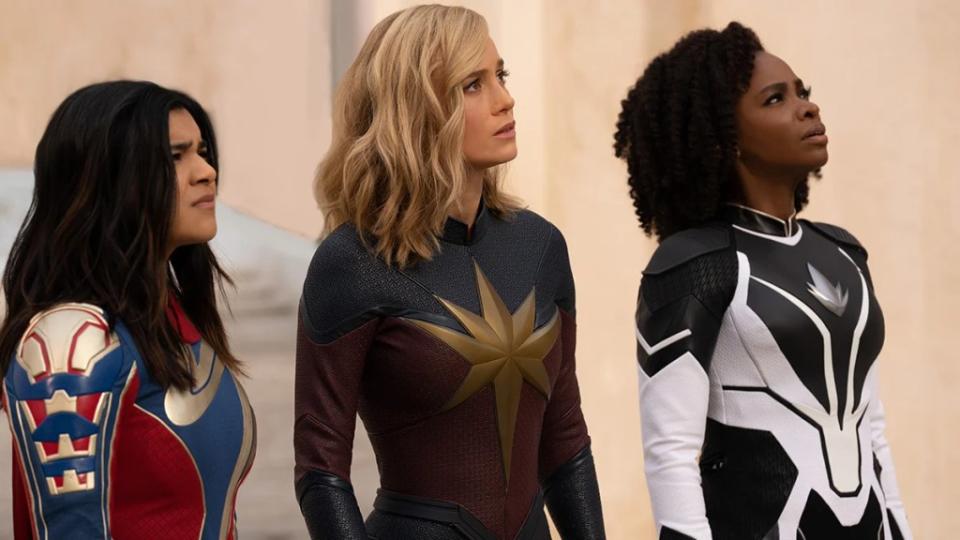‘The Marvels’ Box Office Bust Highlights the MCU’s Biggest Challenge | Analysis
- Oops!Something went wrong.Please try again later.
- Oops!Something went wrong.Please try again later.
“The Marvels” didn’t crash and burn at the box office this past weekend due to superhero fatigue. Nor was it the lowest opening weekend in MCU history because fans were rebelling against the female-driven ensemble — the gender makeup in North America over the opening weekend was 61% male and 39% female.
Instead, the film limped to a $46.1 million opening weekend due to a number of factors including declining trust in the Marvel brand, all of which speak to an existential challenge for Marvel Studios: Make Marvel special again.
Superhero movies within the Marvel and DC universes are now as execution-dependent as other franchise titles. The low opening for the Brie Larson-starring sequel shows that an MCU movie is no longer an automatic must-see event, meaning fans won’t show up just because it’s “the next Marvel movie.” That’s a problem, considering many of Marvel’s upcoming titles, including new variations on the Fantastic Four and the X-Men, are predicated on the MCU brand being enough to get audiences excited.

Why “The Marvels” crashed
There are plenty of reasons why “The Marvels” failed to ignite this past weekend, Chief among them was the fact that two of its main characters require prior knowledge of the Marvel Disney+ shows. Iman Vellani’s Ms. Marvel and Teyonah Parris’ Monica Rambeau were introduced on Disney+ shows that only subscribers to that service watched (“Ms. Marvel” and “Wandavision,” respectively). That was no doubt a smaller pool than the average viewership seeing Marvel films on a big screen. And the actors’ strike meant that Vellani, Parris and Brie Larson couldn’t promote the film to entice new fans to check these characters out.
“Disney made a bet that intertwining multiple TV shows and movies each year would keep audiences coming back for more,” Bruce Nash, founder and publisher of box-office data site The Numbers, told TheWrap. “Instead of making each new movie an event, that’s ended up driving audiences away from the franchise.”
But “The Marvels” also suffered from what came directly before it. Aside from “Guardians of the Galaxy Vol. 3,” the recent string of Marvel movies have been disappointing. “The Marvels” is just the fourth MCU movie — all within the last two years — to earn below 65% fresh on Rotten Tomatoes due to its lackluster reviews.
Its B CinemaScore grade among opening night audiences tied with “Ant-Man and the Wasp: Quantumania” and “Eternals” as the lowest ever for an MCU title. The slew of less-than-beloved features — including “Thor: Love and Thunder” in the summer of 2022 — may have lessened the trust that general audiences have for a brand that once promised a certain level of character-driven showmanship and spectacle.
There are probably a few other reasons for the film’s low-grossing opening weekend. It wasn’t embraced among younger and/or female moviegoers following “Barbie,” “Five Nights at Freddy’s” and “Taylor Swift: The Eras Tour,” and it was a 4.5-years-later sequel to an already middling MCU title. All of this, combined, lead to what the box office reflected this weekend. What’s clear is that Marvel Studios is no longer the most bankable franchise around.
Adjusting to the post-“Endgame” normal
Prior to “Black Panther” ($1.346 billion in 2018) and “Captain Marvel” ($1.128 billion in 2019), not a single non-Iron Man or non-Spider-Man MCU movie earned over $900 million. In the summer of 2018, “Ant-Man and the Wasp” earned $620 million despite opening after “Black Panther” and the $2 billion-grossing “Avengers: Infinity War.” The rising Marvel tide wasn’t going to automatically lift every MCU movie to unthinkable fortune and glory.
The pandemic and a push toward streaming further complicated Disney’s 2021 MCU films. “Black Widow” ($380 million) got a day-and-date theatrical and Disney+ Premier Access release, while “Shang-Chi and the Legend of the Ten Rings” ($435 million on a $150 million budget) and “Eternals” (a flop at $402 million on a $200 million budget with record-low reviews to boot) got conventional theatrical releases.
Disney’s 2022 Marvel movies all earned strong totals, but skewed expectations and a lack of revenue from China and Russia put them on the defensive.
“Doctor Strange in the Multiverse of Madness” earned a mere $960 million and “Thor: Love and Thunder” earned $761 million (more than “Thor: Ragnarok” not counting the threequel’s Russian and Chinese box office). “Black Panther: Wakanda Forever” both opened without pre-COVID marketplaces in Russia and China and without the late Chadwick Boseman. Cue a $859 million total — still huge but a harsh 36% drop.
As Comscore Senior Media Analyst Paul Dergarabedian told TheWrap previously, “Marvel’s post-COVID earnings may represent the most striking example of the importance of China as a key movie market for the superhero genre.”
Indeed, while “Captain America: Civil War” didn’t need its $190 million (out of $1.16 billion worldwide) in China to be a smash hit, the strong box office from 2012 to 2019 helped make Marvel a towering global franchise.
OK, now it’s time to be concerned
It’s hard to look at the 2023 results as anything other than a comedown. “Ant-Man and the Wasp: Quantumania” failed to crack $500 million on a $200 million budget, while scoring even worse reviews than “Eternals” and failing to make fans excited for Jonathan Majors’ Kang as the next would-be Thanos. “Guardians of the Galaxy Vol. 3” was a smash, but writer/director James Gunn is now running DC Studios. And, now, “The Marvels,” a sequel to a film that cracked $1.1 billion, will likely get outgrossed in North America by “The Flash,” an out-and-out bomb for Warner Bros.’ DC.
As we’ve seen in 2023, audiences are becoming increasingly discerning when it comes to superhero movies. A new classic like “Spider-Man: Across the Spider-Verse” can still swing to $690 million worldwide, but merely carrying the Marvel brand no longer gives your movie much of an advantage.
That’s not a new issue for DC (the success of “Joker” didn’t make “Birds of Prey” a hit) or Sony (the success of “Venom” meant little for “Morbius.”) But it’s a new problem, at least on this scale, for Marvel.
If the mere idea of these films taking place within the Marvel Cinematic Universe is no longer an event, will audiences care about another “Blade” film or what will be the fourth attempt to turn “Fantastic Four” into a franchise?
“The idea of a new ‘X-Men’ movie or a more source-faithful ‘Fantastic Four’ film certainly has at least some must-see appeal to audiences,” a high-level distribution executive told TheWrap. But “The Marvels”’ poor showing underscores that Marvel “cannot just count on audiences showing up in droves for new versions of these established properties just because they now take place within the MCU. They have to make sure that the films are themselves special and unique.”

When everyone’s special, no one is
Marvel Studios will release just one film in 2024, the comparatively off-brand “Deadpool 3,” with “Captain America: New World Order” and “Thunderbolts” shifting to 2025. Couple that with a downturn in the sheer amount of Disney+ television shows, and Disney CEO Bob Iger seems to have accepted that an upswing in quantity made each individual Marvel film or show that much less valuable.
“The fact that the studio pushed back their Marvel slate ahead of this release says they knew what was coming,” Nash said.
After all, the success of the MCU was never about audiences desiring superhero movies or cinematic universes in the abstract. Audiences like Marvel movies because they really like the characters and enjoy the movies featuring them. As Nash said, “Now Disney hopefully has time to rethink, rewrite, and reshoot as needed to make films that leave audiences wanting more, rather than struggling to keep up.”
Will Fox acquisition prove crucial to a Marvel turnaround?
Despite the box office struggles of “The Marvels,” Kevin Feige, the president of Marvel Studios, still has some options to revitalize the MCU, thanks largely to Disney’s 2019 acquisition of 21st Century Fox, which owned the film rights to “X-Men” and “Fantastic Four.” In the early 1990s, a financially struggling Marvel Entertainment Group sold off those comic book franchises to Fox. In 2005, 20th Century Fox released the first “Fantastic Four” movie.
The Fantastic Four comic books contain storylines that have yet to be properly adapted, such as “The Coming of Galactus.” Disney is already laying the groundwork for the Fantastic Four’s arrival in the MCU: An alternate version of Mr. Fantastic (played by John Krasinski) appeared in last year’s “Doctor Strange and the Multiverse of Madness.” The standalone film is set for release in 2025.
There is an even deeper connection between Feige and the X-Men franchise. The Marvel executive worked an associate producer on Fox’s 2000 “X-Men” movie, directed by Bryan Singer. That film introduced a more relatable version of the characters and is credited with helping kick off the modern superhero film genre.
There is also potential for crossover between the X-Men and Avengers. The lone mid-credits sequence in “The Marvels” hinted at the idea, with the appearance of a favorite X-Men character from the previous franchise.
Umberto Gonzalez and Drew Taylor contributed to this article.
The post ‘The Marvels’ Box Office Bust Highlights the MCU’s Biggest Challenge | Analysis appeared first on TheWrap.

